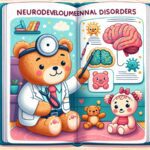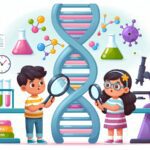Urea Cycle Disorders (UCDs) are a group of rare genetic conditions that affect infants, disrupting the body’s ability to remove waste products from the bloodstream. Understanding these disorders is crucial for new parents, as early diagnosis and treatment can make a significant difference in the health and development of a child. This comprehensive guide will explore what UCDs are, their symptoms, how they are diagnosed, treatment options, and providing care for children with UCDs.
What are Urea Cycle Disorders?
Urea Cycle Disorders are a set of genetic conditions that lead to a deficiency in one of the enzymes in the urea cycle. This cycle is a critical pathway that converts ammonia, a highly toxic substance produced when proteins are broken down, into urea, which is then eliminated from the body through urine. When this cycle is disrupted due to a missing or faulty enzyme, ammonia can build up in the bloodstream, leading to serious health issues.
New parents may not be immediately familiar with these disorders, but understanding the basics of how the urea cycle operates and its role in detoxifying the body can provide essential insights into managing UCDs. Early detection and intervention are key to preventing complications associated with these disorders.
Recognizing the Symptoms of Urea Cycle Disorders
The symptoms of Urea Cycle Disorders can vary widely among individuals, but they often begin to manifest in the early stages of a baby’s life. Common symptoms include excessive sleepiness, poor feeding, vomiting, and a lack of energy. As ammonia levels rise in the bloodstream, more severe symptoms may emerge, such as irritability, breathing difficulties, seizures, and coma.
Being alert to these symptoms is crucial for parents. Promptly seeking medical attention if any of these signs are observed can lead to early diagnosis and treatment, significantly improving outcomes for children with UCDs. It’s important to note that while some symptoms may resemble other common neonatal conditions, the persistence or severity of symptoms warrants immediate medical evaluation.
Diagnosing Urea Cycle Disorders
Diagnosing Urea Cycle Disorders typically involves a combination of clinical evaluation, blood tests to measure ammonia and amino acid levels, and genetic testing. High levels of ammonia in the blood are a key indicator of UCDs. Genetic testing can confirm the diagnosis by identifying specific mutations in the genes responsible for the enzymes in the urea cycle.
Early diagnosis is vital for managing UCDs effectively. New parents should be prepared to provide detailed medical histories and observe their child’s symptoms closely, as this information can be instrumental in diagnosing UCDs. Further, specialized testing and consultation with a geneticist or a metabolic specialist may be recommended.
Treatment Options for Urea Cycle Disorders
Treatment for Urea Cycle Disorders aims to manage ammonia levels in the blood and prevent them from reaching toxic levels. Dietary management is often the first step, involving a protein-restricted diet to reduce the amount of ammonia produced. Additionally, medications may be prescribed to increase the removal of ammonia from the body.
In more severe cases, dialysis may be necessary to rapidly remove ammonia from the bloodstream. For some types of UCDs, liver transplantation may be considered as a long-term treatment option. It is essential for parents to work closely with a team of healthcare professionals, including a dietitian and a metabolic specialist, to develop and monitor an effective treatment plan for their child.
Living with Urea Cycle Disorders: Care and Support
Providing care for a child with a Urea Cycle Disorder can be challenging, but with the right support and resources, families can manage these conditions effectively. It involves close monitoring of dietary intake, regular medical check-ups, and being vigilant for signs of elevated ammonia levels. Parental education on the disorder and its management is crucial.
Support groups and resources for families affected by UCDs can be invaluable. Connecting with other families facing similar challenges can provide emotional support and practical advice. For more information on managing UCDs and accessing support, parents can visit Urea Cycle Disorders on BabyWhysAndHows.
This comprehensive guide aims to equip new parents with the knowledge they need to understand, recognize, and manage Urea Cycle Disorders in their infants. With early diagnosis and proper management, children with UCDs can lead fulfilling lives. Remember, you’re not alone in this journey, and there are resources and communities ready to support you and your child.













